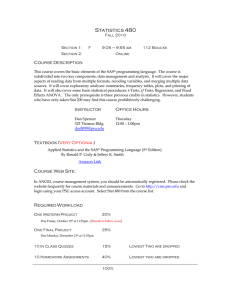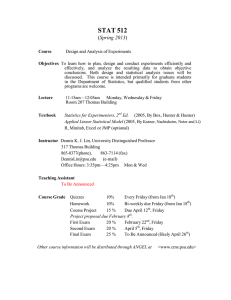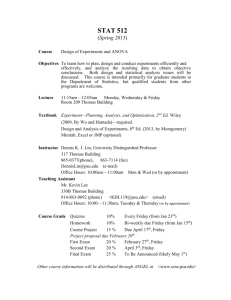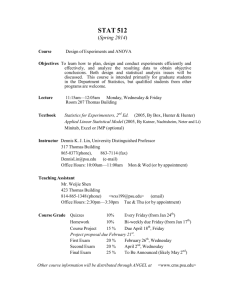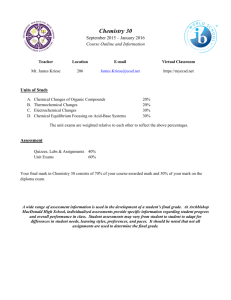Statistics 480 Course Description
advertisement
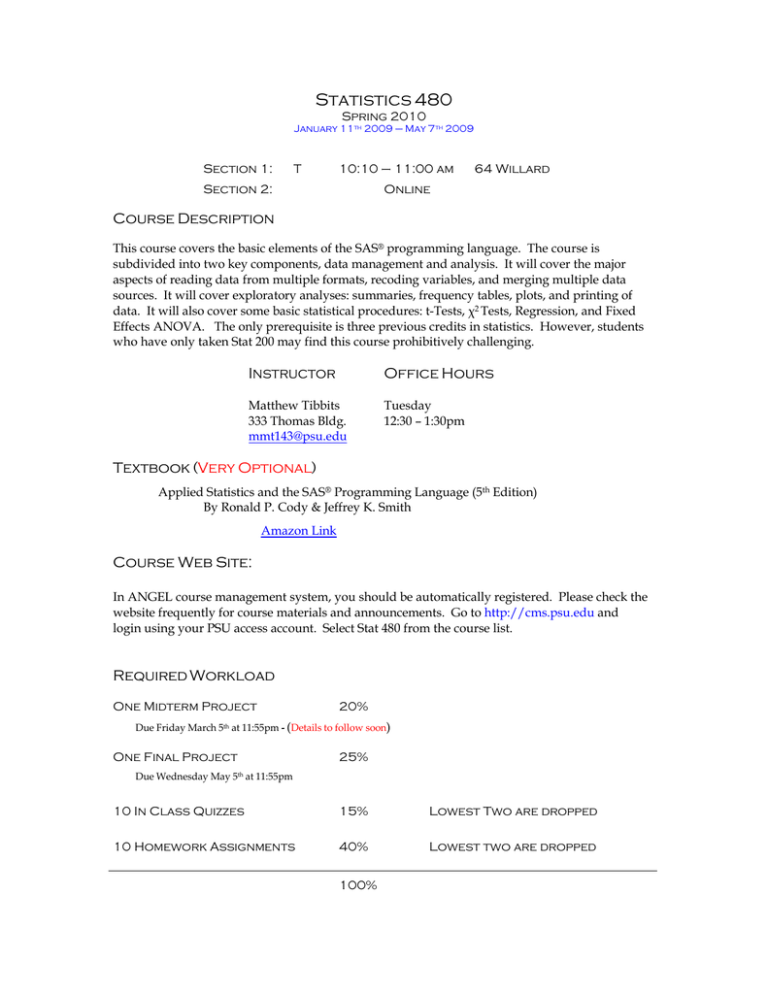
Statistics 480 Spring 2010 January 11th 2009 – May 7th 2009 Section 1: T 10:10 – 11:00 am Section 2: 64 Willard Online Course Description This course covers the basic elements of the SAS® programming language. The course is subdivided into two key components, data management and analysis. It will cover the major aspects of reading data from multiple formats, recoding variables, and merging multiple data sources. It will cover exploratory analyses: summaries, frequency tables, plots, and printing of data. It will also cover some basic statistical procedures: t-Tests, χ2 Tests, Regression, and Fixed Effects ANOVA. The only prerequisite is three previous credits in statistics. However, students who have only taken Stat 200 may find this course prohibitively challenging. Instructor Office Hours Matthew Tibbits 333 Thomas Bldg. mmt143@psu.edu Tuesday 12:30 – 1:30pm Textbook (Very Optional) Applied Statistics and the SAS® Programming Language (5th Edition) By Ronald P. Cody & Jeffrey K. Smith Amazon Link Course Web Site: In ANGEL course management system, you should be automatically registered. Please check the website frequently for course materials and announcements. Go to http://cms.psu.edu and login using your PSU access account. Select Stat 480 from the course list. Required Workload One Midterm Project 20% Due Friday March 5th at 11:55pm ‐ (Details to follow soon) One Final Project Due Wednesday May 5th 25% at 11:55pm 10 In Class Quizzes 15% Lowest Two are dropped 10 Homework Assignments 40% Lowest two are dropped 100% Approximate Grading Scale (Borderlines will not be raised) A A‐ 93% 90% C+ C 77% 70% B+ B B‐ 87% 83% 80% D F 60% < 60% Random Notes If you include “Stat 480” in the subject of your emails, they will be flagged and I will respond to them faster. No makeup quizzes will be offered. Late homework will be accepted at a penalty of 20% per day late. Academic Integrity Policy All Penn State policies regarding ethics and honorable behavior apply to this course (see links below for policy statements). Academic integrity is the pursuit of scholarly activity free from fraud and deception and is an educational objective of this institution. All University policies regarding academic integrity apply to this course. Academic dishonesty includes, but is not limited to, cheating, plagiarizing, fabricating of information or citations, facilitating acts of academic dishonesty by others, having unauthorized possession of examinations, submitting work of another person or work previously used without informing the instructor, or tampering with the academic work of other students. For any material or ideas obtained from other sources, such as the text or things you see on the web, in the library, etc., a source reference must be given. Direct quotes from any source must be identified as such. All exam answers must be your own, and you must not provide any assistance to other students during exams. Any instances of academic dishonesty WILL be pursued under the University and Eberly College of Science regulations concerning academic integrity. Explicitly: Sharing of syntax files, solution files, and/or answer text is strictly forbidden. You may work together on the homework to resolve bugs, but the whole of your submissions must be completely written by you. Collaboration is not permitted on the projects. Special Flu Protocols: In compliance with Pennsylvania Department of Health and Centers for Disease Control recommendations, students should NOT attend class or any public gatherings while ill with influenza. Students with flu symptoms will be asked to leave campus if possible and to return home during recovery. The illness and self-isolation period will usually be about a week. It is very important that individuals avoid spreading the flu to others. Most students should be able to complete a successful semester despite a flu-induced absence. Faculty will provide students who are absent because of illness with a reasonable opportunity to make up missed work. Ordinarily, it is inappropriate to substitute for the missed assignment the weighting of a semester's work that does not include the missed assignment or exam. Completion of all assignments and exams assures the greatest chance for students to develop heightened understanding and content mastery that is unavailable through the weighting process. The opportunity to complete all assignments and exams supports the university's desire to enable students to make responsible situational decisions, including the decision to avoid spreading a contagious virus to other students, staff, and faculty, without endangering their academic work. Students with the flu do not need to provide a physician's certification of illness. However, ill students should inform their teachers (but not through personal contact in which there is a risk of exposing others to the virus) as soon as possible that they are absent because of the flu. Likewise students should contact their instructors as quickly as possible to arrange to make up missed assignments or exams. If you have questions about academic policy-related issues, please call the Associate Dean/Chief Academic Officer of your college. For health-related questions you can email Dr. Margaret Spear, director, University Health Services, at uhsinfo@sa.psu.edu.
